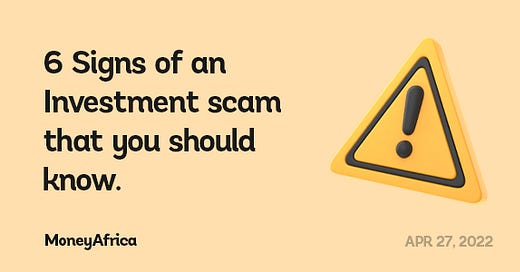Six Signs of an Investment Scam You Should Know
Six Signs of an Investment Scam You Should Know
During a financial literacy session at an event in Lekki, Lagos, Nigeria, I spent more than 45 minutes explaining the importance of financial planning, diversification, short-term and long-term investment, and being patient when it comes to building wealth. I further explained the power of compounding and reiterated the truth that "time" is the secret to building sustainable wealth.
After the session, a young man asked me a startling question. He said:
"Thanks for taking time to explain all these things to us. But which financial asset can I invest the sum of ₦20 million today and get a return of, say, ₦100 million within one year?"
I thought I didn’t hear him correctly. I asked him to restate his question, which he did. At this time, I became weak.
I do understand the economy is harsh and due to currency devaluation, the huge amount you receive as salary or earn as profit on your business has become worthless. A lot of youths are now juggling between 9–5 jobs and side hustles, while another class I call “devourers” are looking for how to dupe people of their hard-earned money.
Social media has become one of the platforms where these devourers perpetrate this evil. They offer unreasonable returns on invested amounts, which ordinarily is not possible for a genuine business deal. However, the gullible ones still fall for this scam or "investment opportunities."
There are several signs to alert you that something is not right with an investment scheme, provided you pay attention and know what you should be checking out for. Here are six of them:
1. If it sounds too good to be true
If an investment sounds too good to be true, it probably is. The returns on such investments are extremely consistent and are not subject to typical market volatility. Investors are promised very high returns with little or no risk, and the early investors are paid off handsomely while feasting on referrals. These fraudsters typically refuse to discuss their “complex strategy” and would usually consist of friends and relatives of the fraudsters. When you see signs like this, run for your life, it’s a Ponzi scheme.
2. It's a new business model
Again, if you are an early investor of new opportunities, then you need to be very careful. This happens when you are offered world-changing opportunities, for instance, in biotech and green tech companies that are particularly popular right now, or in cryptocurrency with no real project backing it. Their business model could even be so promising with a promise to revolutionise the way the world works. If you fall for this gimmick, you could lose all your hard-earned money. But if you are the type that loves to test the waters, then diversification is important. Never go into any investment with all your money. A 10% or 5% could save you from heartbreak or high blood pressure which has sent some to an early grave.
3. You joined through referrals
Another method used by scammers is the "referral" system and the reliance on the power of social circles. Don’t get me wrong, not all referral-based businesses are scams. But in the case of an investment scam, they will pay off the people in the initial rounds of the scam, to persuade them to bring in more of their friends and associates. You are convinced because you know someone who got paid the promised amount. Some are lucky and actually get what they were promised. But once the scammer gets what they want, it’s a "bye-bye!" And you will be left holding the (empty) bag. You remember MMM… Lol.
4. Urgency
At one time, I had to unsubscribe from a mailing list because I was receiving emails with captions such as "Jump on this vehicle or miss your opportunity to become wealthy forever" or "See how I earned ₦10 million doing nothing." I personally hate emotional pressure and would run away from anything that puts me in an uncomfortable space. These scammers will pressure you with “limited time offers” in order to force you to make a quick decision. They don’t give you the time to consider whether their offer makes any sense at all. If you spend so much time to earn your income, you need almost the same time to make investment decisions. Never allow anyone to pressure you into investing what you do not understand. Some will even ask you to bring money so they can trade for you. Avoid them!
5. They are not registered
Any legitimate investment company and the person offering the investment must be registered with the SEC, insurance company or another government agency. Make sure you get verification of this registration. In a world where anything can be forged, confirm their registration by writing or calling the agency they claim to be registered with. It will not always protect you, but registration at least gives you recourse if it does turn out to be a scam.
6. Offers bad investment advice
Scammers could suggest you put “all of your assets” into their investment. They might tell you to take out a loan to obtain the funds to invest with them. I remember in 2021 when a particular crypto coin was trending, some Nigerians borrowed to buy this coin, while others used their house rents and school fees. Of course, it ended in premium tears for many. Anything that goes against common sense should be a huge red flag. It’s your hard-earned money, and yes, you want to invest it so it can earn more. But invest wisely and don’t just give it away to clever thieves.
Three things you should before you invest: Ask, Check and Confirm
Ask: How are the profits generated? What is the maximum amount I can lose? How long must I stay invested? What happens if I want to withdraw my money?
Check: Ensure the information provided by the company is true with regards to the business address and registration. Also check if the owners or managers are competent and have experience. Check if there are complaints or negative comments from related investors. You can start with Nairaland if you are based in Nigeria.
Confirm: After you have asked and checked, ensure you confirm all your findings from necessary regulatory agencies and helpful sites.
This is why at MoneyAfrica, we do not only teach you about investing or educate you on where to put your money, we also educate your mind and teach you how to structure your finances according to your laid out goals.
Did you find this newsletter useful? Please feel free to share it. You can read previous newsletters here
Do you have any questions? You can send an e-mail to info@themoneyafrica.com or send a DM to any of our social media channels.
Don’t forget to:
Join our community, if you are interested in smashing your 2022 financial goals. Yes, 2022 may have just started, but it takes at least 30 days to build great habits that will last you a lifetime. So why not start now? There is a lot you can achieve.
If you would like to document your financial journey in 2022, then our journal would be a great fit for you. It costs ₦7,500 (excluding delivery).
Get a budget sheet to track your monthly expenses. Click here
Get an investment tracker to be on top of all your investment. Click here





